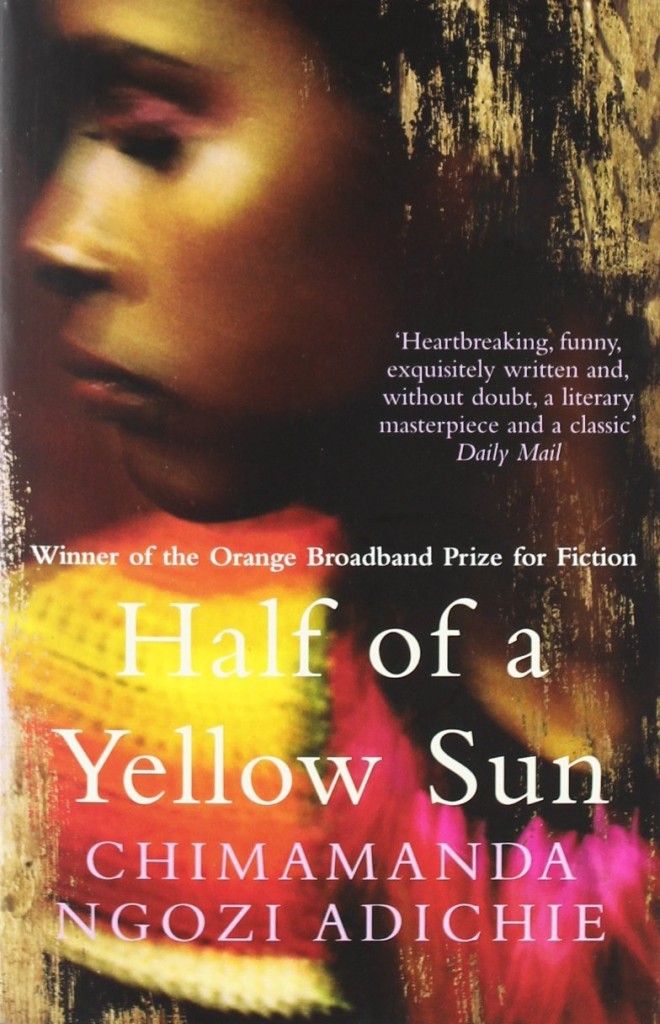To mark 2016 world book and copyright day, we have decided to present to you a list of 50 books by African Women that everyone should. The list was compiled by Dele Meiji Fatunla & Zahrah Nesbitt-Ahmed to celebrate the Africa Writes festival in 2014. We must acknowledge that the list is by no means representative or perfect but it is close.
Please share with us your favorite books by African women they must have missed out in the list.
Please note that the 50th book on the list is ‘above whispers’ addition to the list.
- The Translator
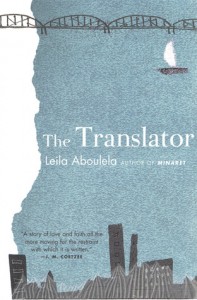
About the Author: Leila Aboulela grew up in Khartoum, Sudan where she attended the Khartoum American School and Sister School. She graduated from Khartoum University in 1985 with a degree in Economics and was awarded her Master’s degree in statistics from the London School of Economics. In 2000, she was the inaugural winner of the Caine Prize for African for her story, The Museum. She lived for many years in Aberdeen where she wrote most of her works while looking after her family; she currently lives and lectures in Abu Dhabi.
About the Book: Leila Abouleila’s debut novel is a nuanced and sensitive portrayal of love and faith; it follows the life of Sammar, a Sudanese widow, living in Scotland and working as an Arabic translator at a university in Aberdeen. Having lost her much-loved husband in a car accident, Sammar has completely abandoned herself to grief. She has spent the four years since his death almost entirely withdrawn from the world, her only comfort the five azan (daily calls to prayer) that gently remind her “only Allah is eternal.” It is not until she begins working for Rae, an agnostic Scottish Islamic scholar that Sammar begins to imagine a happier ending to her story, boldly allowing herself to love this man and to be loved by him, despite her unsettling doubts about his potential for faith.
About the Author: Marguerite Abouet was born in Abidjan in 1971. At the age of 12, she was sent with her older brother to study in France under the care of a great uncle. She now lives in Romainville, a suburb of Paris, where she works as a legal assistant and writes novels she has yet to show to publishers. Aya is her first comic. It taps into Abouet’s childhood memories of Ivory Coast in the 1970s, a prosperous, promising time in that country’s history, to tell an unpretentious and gently humorous story of an Africa we rarely see–spirited, hopeful and resilient.
About the Book: The series is one of the few works of postcolonial African fiction that focuses almost entirely on the middle class. Although not entirely autobiographical, the story is based on the author’s life in Côte d’Ivoire. Aya of Yop City is the second of three books in the Abouet’s Aya series, each based on the same characters. All three of the books in the series haven been illustrated by the author’s husband, Clément Oubrerie. It was adapted into a critically acclaimed animated film, Aya de Youpougon
About the Author: Chimamanda Adichie has been called “the most prominent” of a “procession of critically acclaimed young anglophone authors [that] is succeeding in attracting a new generation of readers to African literature”. Chimamanda Ngozi Adichie was born in Nigeria in 1977. She is the author of three novels, Purple Hibiscus (2003), Half of a Yellow Sun (2006), and Americanah (2013), of a short story collection, The Thing around Your Neck (2009). She has received numerous awards and distinctions, including the Orange Broadband Prize for Fiction (2007) and a MacArthur Foundation Fellowship (2008).
About the Book
Adichie’s sophomore novel wasn’t the first book about the Biafran war, but, on publication, it was a powerful story that humanised in a way never done before the personal cost of the war. In a haunting narrative, that follows the lives of five main characters during the war. Ugwu, a boy from a poor village who works as a houseboy for Odenigbo, university professor; Olanna, who has abandoned her life of privilege in Lagos to live with her charismatic new lover, the professor, and Richard, a shy English writer, in love with Olanna’s enigmatic twin sister, Kainene; a bold, breath-taking, and heart breaking narrative with a shockingly painful ending, it’s a contemporary masterpiece of fiction, which re-loaded the starting gun in the race to write the great African novel.
About the Book: As teenagers in Lagos, Ifemelu and Obinze fall in love – what happens after that – is the subject of this book. A good old fashioned romance with lots of heartbreak, and hair – Americanah is a novel that aimed to say everything anew on race, love and hair from a very, decidedly, Nigerian and African perspective. It tackles African brain drain, blogging, diasporans returning to Africa, US and British strains of racism – and best of all, is laugh out loud funny in more places than we can count.
5. Changes: A Love Story 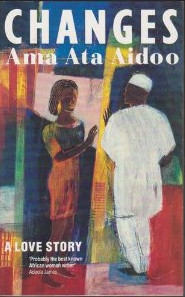
About the Author: Ama Ata Aidoo: Professor Ama Ata Aidoo, née Christina Ama Aidoo (born 23 March 1940, Saltpond) is a Ghanaian author, poet, playwright and academic, who is also a former Minister of Education in the Ghana government. Professor Ama Ata Aidoo, née Christina Ama Aidoo (born 23 March 1940, Saltpond) is a Ghanaian author, poet, playwright and academic, who is also a former Minister of Education in the Ghana government.
About the Book: Before Carrie in Sex and the City – there was Esi, the career-centred heroine of Ama Ata Aidoo’s 1991 novel; a woman who divorces her first husband and marries into a polygamist union, all the while working hard to make it in a challenging modern day, Accra; sumptuously written and totally engrossing, Changes explores the complex world in which the lives of professional working women have changed sharply, but the cultural assumptions of men’s lives have not. This is an immensely unputdownable book.
About the Book: Because when you read it, despite being written in the 1970s, it still feels brazenly contemporary; you’ll find yourself reading and agreeing with young Ghanaian Sissie’s running commentary as she travels through Europe – talking about her feelings of alienation, her reflections on European culture and “civilization” and her return to the warmth of home in Africa. And we absolutely understand her obsession with plums. It’s like reading a commentary by a wry, wise and amusing companion travelling through the tshengen zone, and it’s all the more delightful because it’s a mixture of poetry and prose.
7.African Love Stories: An Anthology 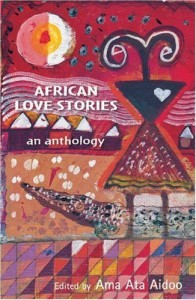
About the book: There are many, many reasons to love this book – and each is a title in this brilliant collection. This anthology is a radical collection of love stories from African women. The collection is a radical departure from conventional anthologies and the love theme is aimed at debunking the myth that African Women are poor and helpless victims whilst showing their strength, complexity and diversity. The stories deal with a range of challenging themes including taboo subjects such as homosexuality, domestic violence, female circumcision, ageism amongst others to produce a melting pot of narratives from interesting and informed perspectives.
8. Our Wife and Other Stories 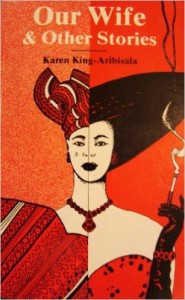
About the Author: Karen King-Aribisala: A Nigerian novelist, and short story writer. Her stories, Our Wife and Other Stories won the 1991 Commonwealth Writers’ Prize, Best First Book Africa, and her novel the hangman’s game won 2008 Best Book Africa. She is Associate Professor of English at the University of Lagos. She won grants from the Ford Foundation, British Council, Goethe Institute, and the James Michener Foundation.
About the Book: Our Wife is the author’s first complete published work of short stories; the work has won the best first book prize (African Region) Commonwealth Price 1990/91.
9. Everything Good Will Come 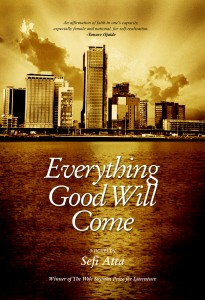
About the Author: Sefi Atta: Nigerian-born Sefi Atta’s short stories have appeared in journals like Los Angeles Review and Mississippi Review and have won prizes from Zoetrope and Red Hen Press. Her radio plays have been broadcast by the BBC. She is the winner of PEN International’s 2004/2005 David TK Wong Prize and in 2006, her debut novel Everything Good Will Come was awarded the inaugural Wole Soyinka Prize for Literature in Africa.
About the Book: Everything Good Will Come is a coming of age novel about a girl growing into a woman in postcolonial Nigeria and England. Throughout the novel the main character, Enitan, is faced with various issues such as family troubles, rape, cheating boyfriends, and imprisonment. Beyond Enitan’s personal entanglements, the novel is a biting commentary on post-independence governments in Nigeria and tensions between Igbo (Biafrans), Yoruba, and Hausa ethnic groups after the Biafrian War.
10. So Long a Letter 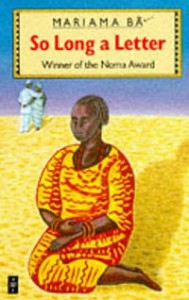
About the Author: Mariama Ba: Born in Dakar, she was raised a Muslim, but at an early age came to criticise what she perceived as inequalities between the sexes resulting from African traditions. Raised by her traditional grandparents, she had to struggle even to gain an education, because they did not believe that girls should be taught. Bâ later married a Senegalese Member of Parliament, Obèye Diop, but divorced him and was left to care for their nine children.
About the Book: This novel is a perceptive testimony to the plight of articulate women who live in social milieux dominated by attitudes and values that deny them their proper place. It is a sequence of reminiscences, some wistful, some bitter, recounted by a recently widowed Senegalese school teacher. The letter, addressed to an old friend, is a record of her emotional struggle for survival after her husband’s abrupt decision to take a second wife. Although his action is sanctioned by Islam, it is a calculated betrayal of his wife’s trust and a brutal rejection of their life together.
11. Tropical Fish: Stories out of Entebbe 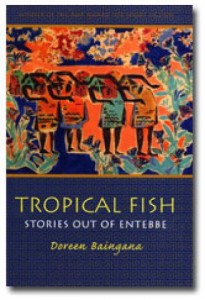
About the Author:Ugandan writer Doreen Baingana is a short story writer and editor – she’s won various prizes for her writing. Until recently, Baingana was chair of FEMRITE – the Uganda Women Writers Association. She has twice been a finalist for the Caine Prize for African Writing and her book Tropical Fish won the 2006 Commonwealth Writers’ Prize for best first book.
About the Book: Tropical Fish is a collection of linked short stories that explore the coming of age of three African sisters. Introspective and personal, the stories reveal the unexpected ambiguities of the young women’s lives.
About the Author: Ellen Banda-Aaku: Ellen Banda-Aaku was born in Woking Surrey in 1965. The middle child of three she grew up in Zambia and has lived and worked in Ghana, South Africa, the UK and Zambia. In 2004 she won the Macmillan Writers’ Prize for Africa for Wandi’s Little Voice, a book for children. In 2007, her short story, Sozi’s Box, was the overall winner of the 2007 Commonwealth Short Story Competition. Her novel “Patchwork,” published 2011, won the Penguin Prize for African Writing. She has a BA in Public Administration from the University of Zambia, an MA in Financial Management with Social Policy from Middlesex University and an MA in Creative Writing from the University of Cape Town. She’s currently is based in the UK where she lives with her two children Saada and Kweku.
About the Book: Destined from birth to inhabit two very different worlds– that of her father, the wealthy Joseph Savakungo, and that of her mother, his mistress– this emotive tale takes us to the heart of a young girl’s attempts to come to terms with her own identity and fashion a future for herself from the patchwork of a life she was born into
- The Shining Girls
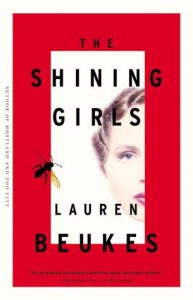
About the Author: Lauren Beukes: A South African novelist, short story writer, journalist, and TV scriptwriter. Beukes, born in Johannesburg, currently lives in Cape Town. She has an MA in Creative Writing from the University of Cape Town. She worked as a freelance journalist for ten years, including two years in New York and Chicago.
About the Book: The jaw-dropping, page-turning, critically-acclaimed book of the year: a serial-killer thriller unlike any other from the award-winning Lauren Beukes. ‘GONE GIRL has not exactly gone. But THE SHINING GIRLS have arrived’ (The Times). “It’s not my fault. It’s yours. You shouldn’t shine. You shouldn’t make me do this.” THE GIRL WHO WOULDN’T DIE. Kirby is lucky she survived the attack. She is sure there were other victims were less fortunate, but the evidence she finds is … impossible. HUNTING A KILLER WHO SHOULDN’T EXIST, Harper stalks his shining girls through the years – and cuts the spark out of them. But what if the one that got away came back for him?
14. We need new names 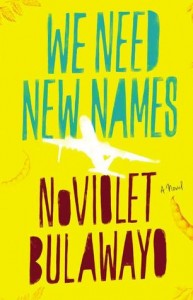
About the Author: No Violet Bulawayo: Noviolet Bulawayo was born in Tsholotsho. She earned her MFA at Cornell University, where she was also awarded a Truman Capote Fellowship, and she is currently a Stegner Fellow at Stanford University in California. She is the author of the short story Hitting Budapest (2010), which won the 2011 Caine Prize for African Writing, and Snapshots (2009), shortlisted for the South Africa PEN Studzinsi Award. Her latest novel We Need New Names (2013) is long listed for the 2013 Man Booker Prize
About the Book: ‘To play the country-game, we have to choose a country. Everybody wants to be the USA and Britain and Canada and Australia and Switzerland and them. Nobody wants to be rags of countries like Congo, like Somalia, like Iraq, like Sudan, like Haiti and not even this one we live in – who wants to be a terrible place of hunger and things falling apart?’ Darling and her friends live in a shanty called Paradise, which of course is no such thing. It isn’t all bad, though. There’s mischief and adventure, games of Find bin Laden, stealing guavas, singing Lady Gaga at the tops of their voices. They dream of the paradises of America, Dubai, and Europe, where Madonna and Barack Obama and David Beckham live. For Darling, that dream will come true. But, like the thousands of people all over the world trying to forge new lives far from home, Darling finds this new paradise brings its own set of challenges – for her and also for those she’s left behind.
15. Daughters of Africa 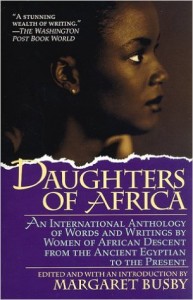
About the Author: Margaret Busby: Margaret Busby OBE (Nana Akua Ackon) Editor was born in Ghana, of part-Caribbean parentage, and educated in Britain. On graduating from London University in the 1960s she became the UK’s youngest and first Black woman publisher when she co-founded Allison & Busby Ltd, of which she was Editorial Director for 20 years. She works as a writer, editor, consultant, reviewer and broadcaster. Publications she has written for include The Guardian, Independent, Observer, New Statesman, and Wasafiri and The Times Literary Supplement.
About the Book: Arranged chronologically, this anthology of writing spans from the Ancient Queen Hatshepsut and the Queen of Sheba, to popular contemporaries such as Maya Angelou, Alice Walker and Buchi Emecheto, and includes many lesser known writers and anonymous traditional works that exemplify the oral tradition handed down through the generations. This anthology brings together women from across the globe and besides translations from African languages it includes work originally written in Dutch, French, German, Portuguese, Russian and Spanish.
- Nervous Conditions
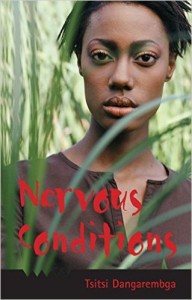
About the Author: Tsitsi Dangarembga: Dangarembga was born in Bulawayo, Rhodesia (now Zimbabwe), in 1959 but spent part of her childhood in England. She began her education there, but concluded her A-levels at Hartzell High school, a missionary school in the Rhodesian town of Umtali (now Mutare). She later studied medicine at Cambridge University but returned home soon after Zimbabwe was internationally recognised in 1980.
About the Book: The semi-autobiographical novel focuses on the story of a Rhodesian family in post-colonial Rhodesia during the 1960s. The novel attempts to illustrate the dynamic themes of race, class, gender, and cultural change during the post-colonial conditions of present-day Zimbabwe.
About the Author: Nawal El Saadawi: is an Egyptian feminist writer, activist, physician and psychiatrist. She has written many books on the subject of women in Islam, paying particular attention to the practice of female genital cutting in her society. She is founder and president of the Arab Women’s Solidarity Association and co-founder of the Arab Association for Human Rights. She has been awarded honorary degrees on three continents. In 2004, she won the North-South prize from the Council of Europe. She is the founder of Health Education Association and the Egyptian Women Writers Association; she was Chief Editor of Health Magazine in Cairo, Egypt and Editor of Medical Association Magazine.
About the Book: ‘All the men I did get to know, every single man of them, have filled me with but one desire: to lift my hand and bring it smashing down on his face. But because I am a woman I have never had the courage to lift my hand. And because I am a prostitute, I hid my fear under layers of make-up’. So begins Firdaus’ story, leading to her grimy Cairo prison cell, where she welcomes her death sentence as a relief from her pain and suffering. Born to a peasant family in the Egyptian countryside, Firdaus suffers a childhood of cruelty and neglect. Her passion for education is ignored by her family, and on leaving school she is forced to marry a much older man. Following her escapes from violent relationships, she finally meets Sharifa who tells her that ‘A man does not know a woman’s value the higher you price yourself the more he will realise what you are really worth’ and leads her into a life of prostitution. Desperate and alone, she takes drastic action.
About the Author: Buchi Emecheta: Is a Nigerian novelist who has published over 20 books. Her themes of child slavery, motherhood, female independence and freedom through education have won her considerable critical acclaim and honours, including an Order of the British Empire in 2005. Emecheta once described her stories as “stories of the world… [Where]… women face the universal problems of poverty and oppression, and the longer they stay, no matter where they have come from originally, the more the problems become identical.”
About the Book: The basis of the novel is the “necessity for a woman to be fertile and above all to give birth to sons”. It tells the tragic story of Nnu-Ego, daughter of Nwokocha Agbadi and Ona, who had a bad fate with childbearing.
19. The Memory of Love 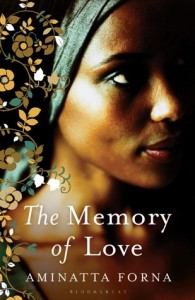
About the Author: Aminatta Forna: born in Scotland, raised in Sierra Leone and Britain and spent periods of her childhood in Iran, Thailand and Zambia. Aminatta is Professor of Creative Writing at Bath Spa University and in 2013 held the post of Sterling Brown Distinguished Visiting Professor at Williams College, Massachusetts. In March 2014 Aminatta Forna was named as a winner of a Donald Windham-Sandy M. Campbell Literature Prize awarded annually by Yale University.
About the Book: Freetown, Sierra Leone, 1969. On a hot January evening that he will remember for decades, Elias Cole first catches sight of Saffia Kamara, the wife of a charismatic colleague. He is transfixed. Thirty years later, lying in the capital’s hospital, he recalls the desire that drove him to acts of betrayal he has tried to justify ever since. Elsewhere in the hospital, Kai, a gifted young surgeon, is desperately trying to forget the pain of a lost love that torments him as much as the mental scars he still bears from the civil war that has left an entire people with terrible secrets to keep. The Memory of Love is a heartbreaking story of ordinary people in extraordinary circumstances
20. July’s People 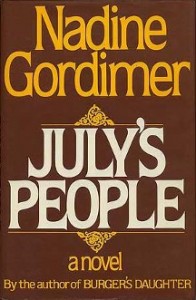
About the Author: Nadine Gordimer: a South African writer, political activist and recipient of the 1991 Nobel Prize in Literature. She was recognized as a woman “who through her magnificent epic writing has – in the words of Alfred Nobel – been of very great benefit to humanity”. Gordimer’s writing has long dealt with moral and racial issues, particularly apartheid in South Africa. Under that regime, works such as July’s People were banned. She was active in the anti-apartheid movement, joining the African National Congress during the days when the organization was banned. She has recently been active in HIV/AIDS causes.
About the Book: For years, it had been what is called a “deteriorating situation.” Now all over South Africa the cities are battlegrounds. The members of the Smales family—liberal whites—are rescued from the terror by their servant, July, who leads them to refuge in his village. What happens to the Smaleses and to July—the shifts in character and relationships—give us an unforgettable look into the terrifying, tacit understandings and misunderstandings between blacks and whites.
21. The Collector of Treasures 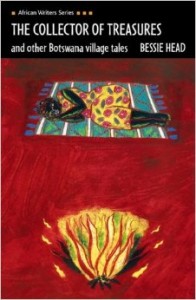
About the Author: Bessie Head: Head was the daughter of a white woman and black man. After her mother’s parents found she was pregnant she was sent to a mental asylum, where Head was born on 6 July 1937. She was brought up by foster parents and then by the Anglican mission orphanage. Head trained as a primary school teacher and taught for a few years but in 1959 she began a career as a journalist. She wrote short stories for Johannesburg’s Golden City Post a weekly supplement that was related to the more famous Drum magazine. Her work for Drum magazine won her a reputation as writer.
About the Book: Bessie Head writes about ordinary women in African villages, often dealing with extraordinary situations. She writes with great love and feeling for these women. In a series of short, simply presented stories, Bessie Head introduces us to women with profound decisions to make, and often difficult circumstances to deal with. How each woman faces these trials and deals with them, reveals the authors deep understanding of the way tragic and profound experiences can enrich us and give greater meaning to our own and others’ lives.
22. In Dependence 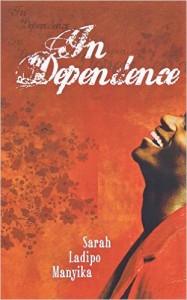
About the Author: Sarah Ladipo: an Anglo-Nigerian writer. She was raised in Nigeria and has lived in Kenya, France, and England. Her writing includes published essays, academic papers, book reviews and short stories. Sarah’s first novel, In Dependence, was published by Legend Press in 2008. Her short story “Mr. Wonder” appeared in the 2008 collection Women Writing Zimbabwe. Sarah inherited her maiden name (Ladipo) from her father who was born in Ibadan (South West Nigeria) in the late 1930s. Sarah herself was born in the UK (where her father met and married her mother in the late 1960s) but she spent much of her childhood in the city of Jos in Plateau State.
About the Book: The novel begins in the early 1960s when Tayo Ajayi meets Vanessa Richardson, the beautiful daughter of an ex-colonial officer. Their story, which spans three continents and four turbulent decades, is that of a brave but bittersweet love affair. It is the story of individuals struggling to find their place within uncertain political times – a story of passion and idealism, courage and betrayal.
23. Secret Son 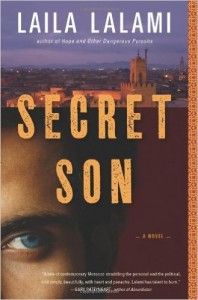
About the Author: Laila Lalami: Laila Lalami was born and raised in Morocco. She attended Université Mohammed-V in Rabat, University College in London, and the University of Southern California, where she earned a Ph.D. in linguistics. She is the author of the short story collection Hope and Other Dangerous Pursuits, which was a finalist for the Oregon Book Award, and the novel Secret Son, which was on the Orange Prize long list. She is the recipient of a British Council Fellowship, a Fulbright Fellowship, and a Lannan Foundation Residency Fellowship and is currently an associate professor of creative writing at the University of California at Riverside.
About the Book: In the spirit of The Inheritance of Loss and The Reluctant Fundamentalist, Laila Lalami’s powerful first novel explores the struggle for identity, the need for family, and the desperation that overtakes ordinary lives in a country divided by class, politics, and religion.
About the Author: Lesley Lokko: A Ghanaian-born Scottish architect, academic, and novelist. She says: “I live almost simultaneously in Johannesburg, London, Accra and Edinburgh.” Much of Lokko’s writing contains themes about cultural and racial identity. [4] She regularly lectures in South Africa, and has also taught in the United Kingdom and the United States.
About the Book: This novel takes four friends, beautiful, wealthy and thoroughly spoilt, Rianne:who has the world at her feet but is about to risk everything, Gabrielle: intelligent, loyal and always worrying about everyone else, and Nathalie: petite, pretty and with a shrewd eye for business, she uses her work to help her forget the one man she can’t have, while flirty and outrageous Charmaine is already sure about what the good life is, she just needs someone to pay for it. A chance encounter changes everything – and for Rianne and her friends, nothing is going to be the same again…
25. Black Mamba Boy 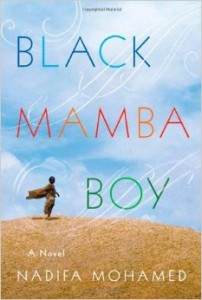
About the Author: Nadifa Mohamed was born in Hargeisa in 1981 while Somalia was falling deeper into dictatorship. In 1986 she moved to London with her family in what she thought was a temporary move but a couple of years later it became permanent as war broke out in Somalia. She was educated in London and went to Oxford to study History and Politics and she finally returned to Hargeisa, now in the new Republic of Somaliland, in 2008. She lives in London and is currently working on her second novel.
About the Book: Long listed for the Orange Prize and winner of the Betty Trask Award. For fans of Half of a Yellow Sun, a stunning novel set in 1930s Somalia spanning a decade of war and upheaval, all seen through the eyes of a small boy alone in the world. Aden, Yemen, 1935; a city vibrant, alive, and full of hidden dangers and home to Jama, a ten year-old boy. But then his mother dies unexpectedly and he finds himself alone in the world. Jama is forced home to his native Somalia, the land of his nomadic ancestors. War is on the horizon and the fascist Italian forces who control parts of East Africa are preparing for battle. Yet Jama cannot rest until he discovers whether his father, who has been absent from his life since he was a baby, is alive somewhere. And so begins an epic journey which will take Jama north through Djibouti, war-torn Eritrea and Sudan, to Egypt. And from there, aboard a ship transporting Jewish refugees just released from German concentration camps, across the seas to Britain and freedom. This story of one boy’s long walk to freedom is also the story of how the Second World War affected Africa and its people; a story of displacement and family.
- Your Madness, Not Mine
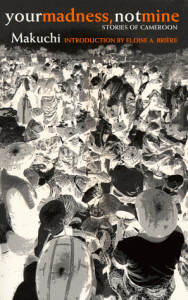
About the Author: Juliana Makuchi: Juliana Makuchi Nfah-Abbenyi is Professor of English and Comparative Literature. She holds doctorates from the University of Yaounde, Cameroon, and from McGill University, Montreal, Canada. Her research is in Postcolonial and World Literatures, Literary Theory, Gender and Women’s Studies. She has lectured nationally and internationally in these fields. Her extensive publications include three books: Gender in African Women’s Writing: Identity, Sexuality, and Difference (Indiana University Press), Your Madness, Not Mine: Stories of Cameroon (Ohio University Press) and The Sacred Door and Other Stories: Cameroon Folktales of the Beba (Ohio University Press). She writes fiction under the pen name, Makuchi.
About the book: The short stories in this collection represent the yearnings and vision of an Anglophone woman, who writes both as a Cameroonian and as a woman whose life has been shaped by the minority status her people occupy within the nation-state. The stories in Your Madness, Not Mine are about postcolonial Cameroon – women, more often than not, are at the centre of these stories that probe their day-to-day experiences of survival and empowerment as they deal with gender oppression: from patriarchal expectations to the malaise of maldevelopment, unemployment, and the attraction of the West for young Cameroonians.
27. Neighbours: The Story of a Murder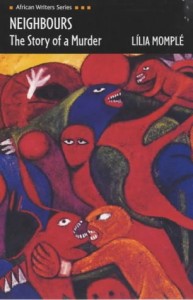
About the Author: Lilia Momplé was born on the Island of Mozambique, into a family of mixed ethnic origins, including Makua, French, Indian, Chinese, and Mauritian. She attended the Instituto Superior de Serviço Social (Higher Institute of Social Service) in Lisbon and graduated with a degree in Social Services. In 1995, she became secretary general of the Association of Mozambican Authors, a position she held until 2001.
About the Book: Neighbours: The Story of A Murder focuses on the destabilisation of Mozambique through short narratives detailing the lives and motivations of seven central characters. Part of the Heinemann African Writers Series, and later the Penguin African Writers series, Neighbours tells the political story of a nation, which is often forgotten by the West, in a thoughtful and provocative manner. This is the story of how a South African conspiracy to infiltrate and destabilise Mozambique creates tragedy for ordinary people.
28. Ripples in the Pool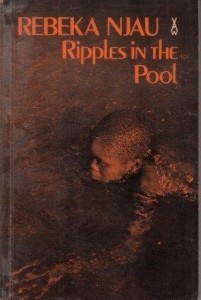
About the Author: Rebeka Njau was a Kenyan artist, playwright and novelist born in a village near the city of Nairobi in Kenya. She was educated at the Alliance Girls High School and Makerere University in Kampala, Uganda and taught at Alliance Girls High School and Makerere College School before spending five years as the founding headmistress of Nairobi Girls School. It was during her career as a teacher that she started writing short stories and plays, most of which were published in Transitions, a literary journal in East Africa in the 1960s. From 1975-1990 she worked with the National Council of Churches of Kenya and was editor of its fortnightly newspaper, Target. When she was growing up, her mother, a Christian evangelist in the 1950s, and her maternal grandfather, a medicine man and a specialised blacksmith, became her greatest source of inspiration.
About the Book: In 1975, Njau published her first novel Ripples in the Pool, a work exploring the struggle between the politics of modernity and the claims of old systems of belief. It tells the story of Selina, an unconventional woman by her society’s standards. who craves to have a man she can manipulate.
Efuru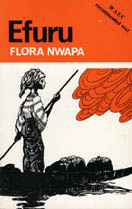
About the Author: Flora Nwapa was a Nigerian writer, teacher, and administrator, a forerunner of a whole generation of African women writers. Flora Nwapa is best-known for re-creating Igbo (Ibo) life and traditions from a woman’s viewpoint. With Efuru (1966) Nwapa became black Africa’s first internationally published female novelist in the English language. She has been called the mother of modern African literature
About the Book: The book is about Efuru, an Ibo woman who lives in a small village in colonial West Africa. Throughout the story, Efuru wishes to be a mother, though she is an independent-minded woman and respected for her trading ability.
I Do Not Come To You By Chance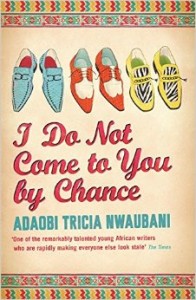
About the Author: Adaobi Tricia Nwaubani is a Nigerian novelist and journalist. I Do Not Come to You by Chance, her debut novel set amidst the perilous world of Nigerian email scams was the winner of the 2010 Commonwealth Writers Prize for Best First Book (Africa). She lives in Lagos, and works with Nigeria’s groundbreaking NEXT newspaper
About the Book: A deeply moving debut novel set amid the perilous world of Nigerian email scams, I Do Not Come to You by Chance tells the story of one young man and the family who loves him.
31. The Promised Land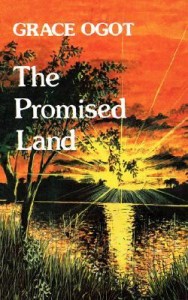
About the Author: Grace Ogot is one of the few well-known woman writers in Kenya, Ogot was the first woman to have fiction published by the East African Publishing House. Her stories—which appeared in European and African journals such as Black Orpheus and Transition and in collections such as Land Without Thunder (1968), The Other Woman (1976), and The Island of Tears (1980)—give an inside view of traditional Luo life and society and the conflict of traditional with colonial and modern cultures. Her novel The Promised Land (1966) tells of Luo pioneers in Tanzania and western Kenya.
About the Book: A young farmer and his wife who have migrated to Tanzania from Kenya become embroiled in issues of personal jealousy and materialism, and a melodramatic tale of tribal hatreds ensues. The novel explores Ogot’s concept of the ideal African wife: obedient and submissive to her husband; family and community orientated; and committed to non-materialist goals.
32. Bitter Leaf
About the Author: Chioma Okereke was born in Nigeria and came to England at the age of seven. She started her writing career as a poet before turning her hand to fiction. Her writing has been published in Bum Rush the Page and The Callaloo Literary Journal. Additionally, her work has been shortlisted in the Undiscovered Authors Competition 2006, run by Bookforce UK, and in the Daily Telegraph’s, write a Novel in a Year Competition 2007.
About the Book: Bitter Leaf is a richly textured and intricate novel set in Mannobe, a world that is African in nature but never geographically placed. At the heart of the novel is the village itself and its colourful cast of inhabitants: Babylon, a gifted musician who falls under the spell of the beautiful Jericho who has recently returned from the city; Mabel and Melle Codon, twin sisters whose lives have taken very different paths, Magdalena, daughter of Mabel, who nurses an unrequited love for Babylon and Allegory, the wise old man who adheres to tradition. As lives and relationships change and Mannobe is challenged by encroaching development, the fragile web of dependency holding village life together is gradually revealed.
33. Zahrah the Windseeker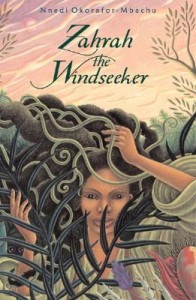
About the Author: Nnedi Okorafor, the American-born daughter of Igbo Nigerian parents, has regularly visited Nigeria since she was very young. Her novels and stories reflect both her West African heritage and her American life. Okorafor is a 2001 graduate of the Clarion Writers Workshop in Lansing, Michigan, and holds a Ph.D. in English from the University of Illinois, Chicago. She is a professor of creative writing at Chicago State University and lives with her family in Illinois.
About the Book: Zahrah the Windseeker is one of a very small handful of young adult fantasy novels that incorporate the myths and folklore and culture of West Africa. It is the winner of the 2008 Wole Soyinka Prize for Literature in Africa. Set in the northern Ooni Kingdom, fear of the unknown runs deep and children born dada are rumoured to have special powers. Thirteen-year-old Zahrah Tsami feels like a normal girl – she grows her own flora computer, has mirrors sewn onto her clothes and stays clear of the Forbidden Greeny Jungle. But unlike other children in the village of Kirki, Zahrah was born with the telling dadalocks.
34. The Spider King’s Daughter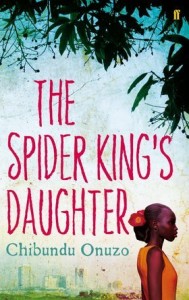
About the Author: Chibundu Onuzo was born in Nigeria in 1991 and is the youngest of four children. In 2010, Onuzo, then an undergraduate studying History at King’s College London, made headlines after signing a two-novel deal with Faber & Faber, making her its youngest ever female author . When not writing, Chibundu can be found playing the piano or singing.
About the book: Seventeen-year-old Abike Johnson is the favourite child of her wealthy father. She lives in a She lives in a sprawling mansion in Lagos, protected by armed guards and ferried everywhere in a huge black jeep. But being her father’s favourite comes with uncomfortable duties, and she is often lonely behind the high walls of her house. A world away from Abike’s mansion, in the city’s slums, lives a seventeen-year-old hawker struggling to make sense of the world. His family lost everything after his father’s death and now he runs after cars on the roadside selling ice cream to support his mother and sister. When Abike buys ice cream from the hawker one day, they strike up an unlikely and tentative romance, defying the prejudices of Nigerian society. But as they grow closer, revelations from the past threaten their relationship and both Abike and the hawker must decide where their loyalties lie.
35. Dust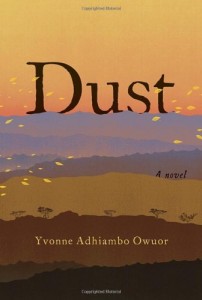
About the Author: Yvonne Adhiambor Owuor is a Kenyan writer, who was named “Woman of the Year” by Eve Magazine in Kenya in 2004 for her contribution to the country’s literature and arts. She won the 2003 Caine Prize for African Writing for her story “Weight of Whispers”, which considers an aristocratic Rwandan refugee in Kenya. The story was originally published in Kwani?, the Kenyan literary magazine set up by Binyavanga Wainaina after he won the Caine Prize the previous year.
About the Book: From a breath-taking new voice, a novel about a splintered family in Kenya—a story of power and deceit, unrequited love, survival and sacrifice.
Odidi Oganda, running for his life, is gunned down in the streets of Nairobi. His grief-stricken sister, Ajany, just returned from Brazil, and their father bring his body back to their crumbling home in the Kenyan dry lands, seeking some comfort and peace. But the murder has stirred memories long left untouched and unleashed a series of unexpected events: Odidi and Ajany’s mercurial mother flees in a fit of rage; a young Englishman arrives at the Ogandas’ house, seeking his missing father; a hardened policeman who has borne witness to unspeakable acts reopens a cold case; and an all-seeing Trader with a murky identity plots an overdue revenge. In scenes stretching from the violent upheaval of contemporary Kenya back through a shocking political assassination in 1969 and the Mau Mau uprisings against British colonial rule in the 1950s, we come to learn the secrets held by this parched landscape, buried deep within the shared past of the family and of a conflicted nation.
The Secret Lives of Baba Segi’s Wives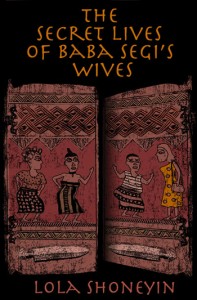
About the Author: Lola Shoneyin is a Nigerian poet and author who published her debut novel, The Secret Lives of Baba Segi’s Wives, in the UK in May 2009. Shoneyin has already forged a reputation as an adventurous, humorous and outspoken poet (often classed in the feminist mould), having published three volumes of poetry. In April 2014 she was named on the Hay Festival’s Africa39 list of 39 Sub-Saharan African writers aged under 40 with potential and talent to define trends in African literature. She lives in Abuja, Nigeria.
About the Book: To the dismay of her ambitious mother, Bolanle marries into a polygamous family, where she is the fourth wife of a rich, rotund patriarch, Baba Segi. She is a graduate and therefore a great prize, but even graduates must produce children and her husband’s persistent bellyache is a sign that things are not as they should be. Bolanle is too educated for the ‘white garment conmen’ Baba Segi would usually go to for fertility advice, so he takes her to hospital to discover the cause of her barrenness. Weaving the voices of Baba Segi and his four competing wives into a portrait of a clamorous household of twelve, Lola Shoneyin evokes an extraordinary Nigerian family in splashes of vibrant colour.
About the Author: Ahdaf Soueif was born in Cairo and educated in Egypt and England, where she studied for a Ph.D. at the University of Lancaster. Ahdaf Soueif lives in London and Cairo. She writes regularly for The Guardian and is a key political commentator on Egypt and Palestine. She is the founder of the Palestine Festival of Literature, Pal Fest.
About the Book: In 1900 Lady Anna Winterbourne travels to Egypt where she falls in love with Sharif, and Egyptian Nationalist utterly committed to his country’s cause. A hundred years later, Isabel Parkman, an American divorcee and a descendant of Anna and Sharif, goes to Egypt, taking with her an old family trunk, inside which are found notebooks and journals which reveal Anna and Sharif’s secret.
38. This September Sun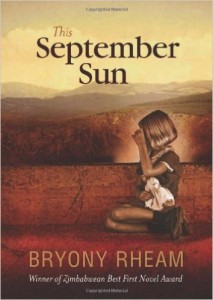
About the Author: Bryony Rheam was born in Kadoma, Zimbabwe, in 1974 and grew up in small mining towns until her family finally moved to Bulawayo. She left Zimbabwe at the age of eighteen and went to the UK, where she worked and studied for seven years. After completing her MA at the University of Kent at Canterbury, she taught in Singapore for a year and then decided to return to Zimbabwe in 2001. She currently lives in Ndola, Zambia, where she is a part-time English teacher. She is currently working on her second novel.
About the Book: Winner of Best First Book Award at Zimbabwe International Book Fair 2010. Ellie is a shy girl growing up in post-Independence Zimbabwe, longing for escape from the confines of small-town life. When she eventually moves to Britain, her wish seems to have come true. But life there is not all she imagined. And when her grandmother Evelyn is brutally murdered, a set of diaries are uncovered spilling out family secrets and recounting a young Evelyn’s passionate and dangerous affair with a powerful married man. In the light of new discoveries, Ellie begins to re-evaluate her relationship with her grandmother, and must face up to some truths about herself in the process. Set against the backdrop of a country in change, Ellie burdened by the memories and the misunderstandings of the past must also find a way to move forward in her own romantic endeavours.
Distant View of a Minaret and Other Stories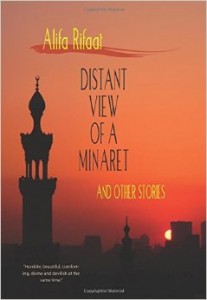
About the Author: Alifa Rifaat was an Egyptian author whose controversial short stories are renowned for their depictions of the dynamics of female sexuality, relationships, and loss in rural Egyptian culture. While taking on such controversial subjects Fatimah Rifaat’s protagonists remained religiously faithful and passive feelings towards their fate. Fatimah Rifaat used the pseudonym Alifa to prevent embarrassment on the part of her family due to the themes of her stories and her writing career.
About the Book: More convincingly than any other woman writing in Arabic today, Alifa Rifaat, an Egyptian, lifts the veil on what it means to be a woman living within a traditional Muslim society. Her writing articulates a subtle revolt against, and a sympathetic insight into, the place of women in the essentially male-dominated Islamic environment. Change, development, and understanding are called for but the invocation is couched in specifically Arab terms; her inspiration lies not in the Women’s Movement of the West but remains within a strictly religious, even Orthodox Qur’anic framework.
As the Crow Flies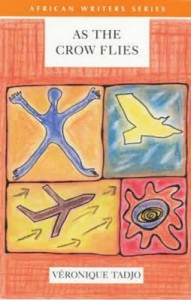
About the Author: Véronique Tadjo is a writer, poet, novelist, and artist from Côte d’Ivoire. Having lived and worked in many countries within the African continent and diaspora, she feels herself to be pan-African, in a way that is reflected in the subject matter, imagery and allusions of her work.
About the Book: This ground-breaking novel represents a set of universal experiences which can be read as a mosaic of life in the 20th century. As The Crow Flies describes the way in which the text is written; Tadjo flies over different lives and experiences – as a crow does – occasionally swooping down on one small detail or character, moving between relationships in search of truth
The Blind Kingdom (also by Véronique Tadjo)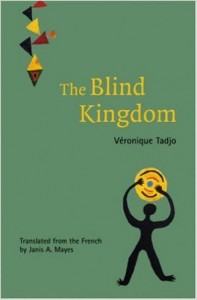
About the Book: This multi-layered narrative comprises a series of interwoven short stories and poetic texts which can be read within continental Africa, the African Diaspora and beyond. Véronique Tadjo imagines an African society on the brink of total collapse, yet there is no doubt that the story resonates in unsettling ways with recent political and social unrest in Côte d´Ivoire. This is a lyrical and yet haunting story, a book of love with fresh insights into the unfinished and complex struggles for African independence.
On Black Sisters Street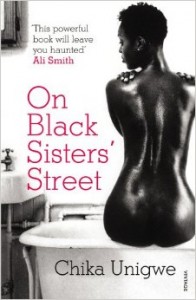
About the Author: Chika Unigwe is a Nigerian-born author of fiction, poetry and articles based in Belgium who writes in both English and Dutch. In April 2014 she was selected for the Hay Festival’s Africa39 list of 39 Sub-Saharan African writers aged under 40 with potential and talent to define future trends in African literature.
About the Book: Four very different women have made their way from Africa to Brussels. They have come to claim for themselves the riches they believe Europe promises but when Sisi, the most enigmatic of the women, is murdered, their already fragile world is shattered. Drawn together by tragedy, the remaining three women – Joyce, a great beauty whose life has been destroyed by war; Ama, whose dark moods manifest a past injustice; Efe, whose efforts to earn her keep are motivated by a particular zeal – slowly begin to share their stories.
43. Looking for Transwonderland: Travels in Nigeria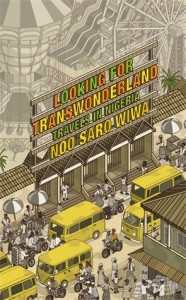
About the Author: Noo Saro-Wiwa was born in Nigeria in 1976 and raised in England. She attended King’s College London and Columbia University in New York and has written travel guides for Rough Guide and Lonely Planet. She currently lives in London. Her first book Looking for Transwonderland: Travels in Nigeria was published by Granta in January 2012 to brilliant reviews and was chosen by the Financial Times Life & Arts as one of the best books of the year, and by The Sunday Times as Travel Book of the Year 2012.
About the Book: Noo Saro-Wiwa was brought up in England, but every summer she was dragged back to Nigeria – a country she viewed as an annoying parallel universe where she had to relinquish all her creature comforts. Then her father, activist Ken Saro-Wiwa, was murdered there, and she didn’t return for 10 years. Recently, she decided to come to terms with the country her father loved. She travelled from the exuberant chaos of Lagos to the calm beauty of the eastern mountains; from the eccentricity of a Nigerian dog show to the empty Transwonderland Amusement Park. Looking for Transwonderland is an engaging portrait of a country whose beauty and variety few of us will experience, depicted with wit and insight by a refreshing new voice in contemporary travel writing.
44. Butterfly Burning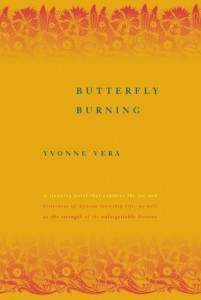
About the Author: Yvonne Vera was an award-winning author from Zimbabwe. Her novels are known for their poetic prose, difficult subject-matter, and their strong women characters, and are firmly rooted in Zimbabwe’s difficult past. For these reasons, she has been widely studied and appreciated by those studying postcolonial African literature.
About the Book: Set in Makokoba, a black township, in the late l940s, Butterfly Burning is an intensely bittersweet love story. When Fumbatha, a construction worker, meets the much younger Phephelaphi, he “wants her like the land beneath his feet from which birth had severed him.” He in turn fills her “with hope larger than memory.” But Phephelaphi is not satisfied with their “one-room” love alone. The qualities that drew Fumbatha to her, her sense of independence and freedom, end up separating them. And the closely woven fabric of township life, where everyone knows everyone else, has a mesh too tight and too intricate to allow her to escape her circumstances on her own. Vera exploits language to peel away the skin of public and private lives. In Butterfly Burning she captures the ebullience and the bitterness of township life, as well as the strength and courage of her unforgettable heroine.
45. Nehanda (also by Yvonne Vera)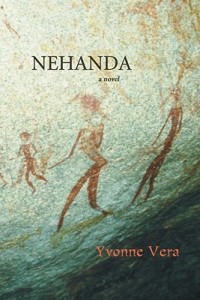
About the Book: Set in Yvonne Vera’s home country of Zimbabwe, Nehanda tells the story of a late nineteenth century village where a young woman has been given a divine calling: the gift to inspire a war. Told in beautifully lucid and evocative prose, this is the portrait of resistance and struggle, a tale of a people’s first meeting with colonialism.
Teaching my Mother How to Give Birth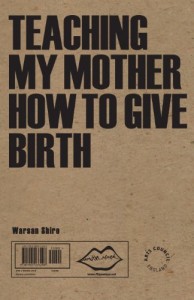
About the Author: Warsan Shire was born in 1988 in Kenya to Somali parents. She later emigrated to London. Shire thereafter began writing poetry as a way to connect with her Somali heritage and her roots in Somalia. Her verse first gained notice after her poem “For Women Who Are Difficult to Love” went viral. In 2011, she also released Teaching My Mother How To Give Birth, a poetry pamphlet published by flipped eye. In April 2013, Shire was presented with Brunel University’s inaugural African Poetry Prize, an award earmarked for poets who have yet to publish a full-length poetry collection. She was chosen from a shortlist of six candidates out of a total 655 entries. In October 2013, Shire was also selected from a shortlist of six young bards as the first Young Poet Laureate for London. The honour is part of the London Legacy Development Corporation’s Spoke programme, which focuses on promoting arts and culture in Queen Elizabeth Olympic Park and the surrounding area.
About the Book: What elevates teaching my mother how to give birth, what gives the poems their disturbing brilliance, is Warsan Shire’s ability to give simple, beautiful eloquence to the veiled world where sensuality lives in the dominant narrative of Islam; reclaiming the more nuanced truths of earlier times – as in Tayeb Salih’s work – and translating to the realm of lyric the work of the likes of Nawal El Saadawi. As Rumi said, “Love will find its way through all languages on its own”; in ‘teaching my mother how to give birth’, Warsan’s début pamphlet, we witness the unearthing of a poet who finds her way through all preconceptions to strike the heart directly. Warsan Shire is a Kenyan-born Somali poet and writer who is based in London. Born in 1988, she is an artist and activist who uses her work to document narratives of journey and trauma. Warsan has read her work internationally, including recent readings in South Africa, Italy and Germany, and her poetry has been translated into Italian, Spanish and Portuguese.
47. The Ghost (Le Revenant in French)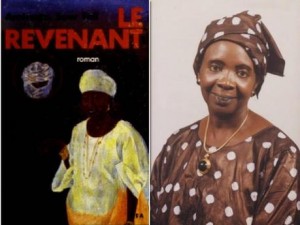
About the Author: Aminata Sow Fall was born in Saint-Louis, Senegal. After spending several years at the Faidherbe grammar school, she finished her secondary schooling at the Van Vo grammar school in Dakar. She then went to France where she completed a licence in Modern Languages. She married in 1963 and returned to Senegal where she became a teacher before working for the National Reform Commission for the Teaching of French. Subsequently, she was appointed Director of la Propriété littéraire [The Literary Property] in Dakar (1979-1988). Sow’s best known novel (and the only one in English translation) is The Beggar’s Strike (1979). She is currently the Director of both the Centre Africain d’Animation et d’Echanges Culturels and Khoudia publishing house in Fann, Dakar. Aminata Sow Fall was also at the head of the Centre International d’Etudes, de Recherches et de Réactivation sur la Littérature, les Arts et la Culture that organized regular national and international Conferences in Saint-Louis. In 1997, Aminata Sow Fall was awarded an Honorary Degree at Mount Holyoke College, South Hadley, Massachusetts.
About the Book: When an honest post office worker, Bakar, realises that he is in debt because he has been financing the extravagant needs of his circle of family and friends, he steals money from his employer and ends up in prison for misappropriation of funds. He is then abandoned by all those who had profited from his extravagance and so Bakar decides to get his revenge.
48. Men of the South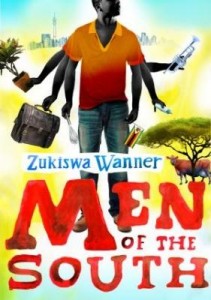
About the Author: Zukiswa Wanner is a South African journalist and novelist. Here debut novel, The Madams, was shortlisted for the K. Sello Duiker Award in 2007 and in April 2014 Wanner was named on the Hay Festival’s Africa39 list of 39 sub-Saharan African writers under the age of 40 with potential to define trends in African literature.
About the Book: Shortlisted for the Commonwealth Writers’ Prize 2011: Africa Region, Men of the South is a fascinating novel about three men out from three worlds. Mfundo the musician and dad, Mzi – gay, but married, and Tinaye – a displaced Zimbabwean in South Africa.
David’s Story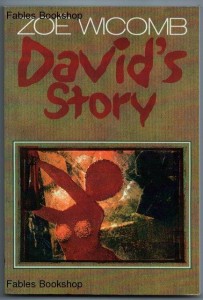
About the Author: Zoe Wicomb gained attention in South Africa and internationally with her first work, a collection of short stories, You Can’t Get Lost in Cape Town (1987), which takes place during the apartheid era. Her second novel, David’s Story (2000), takes place in 1991 toward the close of the apartheid era and explores racial identity. Playing in the Light, her third novel, released in 2006, covers similar terrain conceptually. It is set in mid-1990s Cape Town and centers around the theme of racial passing. Her second collection of short stories, The One That Got Away, is set mainly in Cape Town and Glasgow and explores a range of human relationships: marriage, friendships, family ties and relations with servants.
About the Book: Unfolding in South Africa, at the moment of Nelson Mandela’s release from prison in 1991, this novel explores the life and vision of a male activist through the pen of a female narrator. David Dirkse is part of the underground world of activists, spies and saboteurs in the liberation movement — a world seldom revealed to outsiders. With ‘time to think’ after the unbanning of the movement, David is researching his roots in history of the mixed-race ‘Coloured’ people of South Africa and of their antecedents among the indigenous people and early colonial settlers. This story provides compelling history that is vividly personal, through the powerful filter of storytelling. Through voices that weave together — responding to, illuminating, and sometimes contradicting one another — Wicomb depicts a world where ‘truth upon conflicting truth wriggles into shape’. The dramatic and violent turns at the close of the novel further testify to the complexity of truth — and of telling.
50. Speaking for Myself
About the Author: Bisi Adeleye- Fayemi is a Gender Specialist, Social change Philanthropist, Social Entrepreneur, Policy Advocate, Ttainer, Feminist, Scholar and Activist. She is the Founder of African Women’s Leadership Institute which has trained over 6,000 women leaders across Africa. She is also co-Founder of African Women’s Development Fund, a pan- African grant-making foundation that supported over 1,000 women’s in at least 42 African countries. She is one of the most vocal women’s rights activists and thinkers on the African continent and a leading voice not only in the African women’s movement and civil society, but in the global women’s movement as well.
About the Book:Perspectives on Social, Political and Feminist activism.

